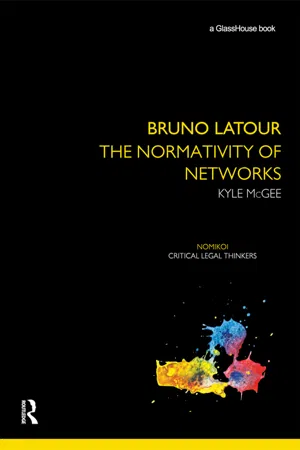
- 250 pages
- English
- ePUB (mobile friendly)
- Available on iOS & Android
About This Book
The first extended study of Bruno Latour's legal theory, this book presents a critical reconstruction of the whole of Latour's oeuvre to date, from Laboratory Life to An Inquiry into the Modes of Existence. Based on the powerful insights into normative effects that actor-network theory makes possible, the book advances a new theory of legal normativity and the force of law, rethinking Latour's work on technology, the image, and referential scientific inscriptions, among others, and placing them within the ambit of legality. The book also captures and deepens the contrast between the modern legal institution and the value of law as a mode of existence, and provides a fulsome theoretical account of legal veridiction. Throughout, Latour's thought is put into dialogue with important progenitors and adversaries as well as historical and contemporary strands of legal and political philosophy.
But the thread of legality is not confined to Latour's reflections on the making of law; rather, it cuts through the whole of his highly diverse body of work. The empire of mononaturalism augured by modern philosophies of science is thoroughly juridical; as such, the actor-network theory that promises to undo that empire by freeing the value of the sciences from its epistemological clutches is unthinkable without the device of the trial and the descriptive semiotics of normativity that sustain ANT. The democratization of the sciences and the vibrancy of ecologized politics that become possible once the bifurcation of nature into essential primary and disposable secondary qualities is disabled, and once the 'modern Constitution' is called into doubt, also have important legal dimensions that have gone largely unexamined. Bruno Latour: The Normativity of Networks remedies this and other omissions, evaluating Latour's thought about law while carrying it in striking new directions.
This book introduces legal scholars and students to the thought of the philosopher and sociologist Bruno Latour, whilst also presenting a critical analysis of his work in and around law. This interdisciplinary study will be of interest to those researching in Law, Philosophy, and Sociology.
Frequently asked questions
Table of contents
- Cover
- Halftitle Page
- Nomikoi: Critical Legal Thinkers
- Title Page
- Copyright Page
- Contents
- Acknowledgments
- Legend
- Preface
- 1. Between Facticity and Normativity
- 2. Law and Cosmopolitics
- 3. Legal Anthropologics: Latour’s Anti-jurisprudence
- 4. How to Speak Well of Law
- Bibliography
- Index